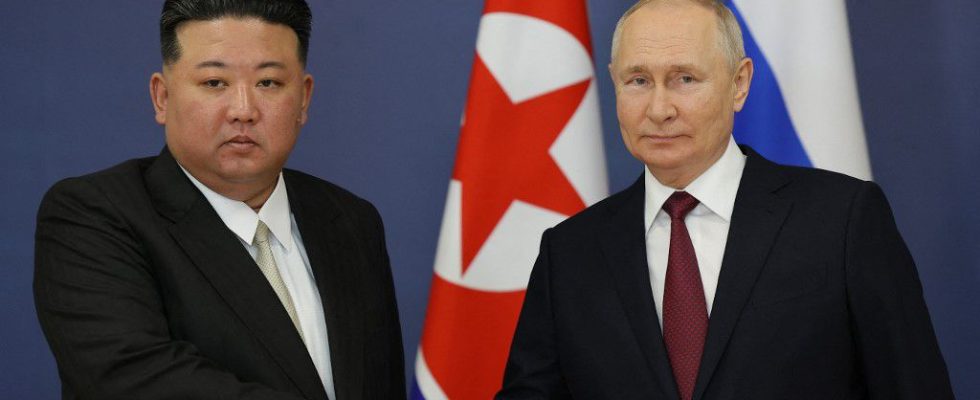Although little information has filtered out about the content of their discussions, Vladimir Putin and Kim Jong-un were at least able to show their rapprochement. Arriving Wednesday, September 13 at the Vostotchny cosmodrome aboard his armored train, during a several-day trip to Russia, the North Korean leader was full of praise for his Russian counterpart. . “We will always be with Russia,” he said, among other pleasantries. Opposite, Putin toasted the “future strengthening of cooperation” with Pyongyang, claiming to see “prospects” in the military field.
In the absence of an official announcement, the head of the Kremlin raised the possibility of helping North Korea build satellites, while Pyongyang has failed twice this year to put a spy satellite into orbit. “We can fear military cooperation between the two countries, which would be based on transfers of technology in the space field on the Russian side, against North Korean munitions which Moscow urgently needs in Ukraine, notes General (2S) Jérôme Pellistrandi, editor in chief of the National Defense Magazine. North Korea has the advantage of having calibers of Soviet origin, which are the same as those used by Russia.
Not enough to change the situation in Ukraine
Pyongyang, which is still theoretically in a state of war with South Korea, has vast stocks of munitions. Among other materials that may be of interest to Moscow: 122 mm rockets used by Soviet BM-21 Grad multiple rocket launchers, but also 152 mm shells and artillery pieces, used en masse. This potential new influx of munitions “will not, however, be a game changer, decides General Pellistrandi. This will be a boost, but it is unlikely that North Korea will be able to cover the colossal needs of the Russian army on its own.” According to some recent estimates, the Russian army has fired between 10 and 11 million shells last year in Ukraine.
The meeting of the two autocrats did not fail to revive international concerns. “The North Korea-Russia summit is a serious challenge that threatens not only peace in Northeast Asia, but also world peace,” warned South Korean ruling party leader Kim Gi- hyeon, this Thursday, denouncing an “evil pact”. “This could make possible violations of the ban by the Security Council [de l’ONU] of any arms sale to North Korea”, affirmed, in the process, the Japanese Minister of Foreign Affairs, Yoko Kamikawa. All the resolutions against Pyongyang adopted at the United Nations, between 2006 and 2017, had however been voted by Russia.
Concerns in Asia
Washington fears that Russian satellite assistance will help improve North Korea’s ballistic missile program, as US State Department spokesperson Matthew Miller confirmed on Wednesday. For experts, this military cooperation, if confirmed, could however not stop there. “We may fear that North Korea will ask for help from Russia for the development of its nuclear-powered submarine program, points out Cheong Seong-chang, researcher at the Sejong Institute in Seoul. Many specialists believe that Pyongyang will not “will fail to meet its goal of building such a submarine by 2025, but that could change if the North Korean regime gets help from Moscow.”
It remains to be determined whether Russia would really be ready to engage in such technology transfers – which would certainly precipitate an arms race in the region. “I find it difficult to see Beijing turning a blind eye to a headlong rush of this type,” says General Pellistrandi. “An escalation would necessarily have a major economic impact on China, and therefore on the political stability of its regime.” Beyond the Chinese regime, Seoul’s reaction could also not suit Moscow’s business. “If Russia helps North Korea develop its spy satellites, or obtain nuclear-powered submarines, this will probably push the South Korean government to deliver weapons directly to Ukraine,” says Cheong Seong -chang. Putin will have to maneuver skillfully.
